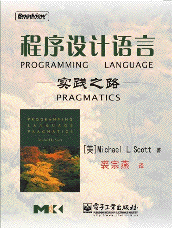Programming Language Pragmatics 2nd Edition Pdf

Contents • • • • • • Education and teaching [ ] Scott received a from the in 1985. He joined the faculty at Rochester the same year as an assistant professor of computer science. Scott was chair of the computer science department from 1996 until 1999, when he was succeeded. He served again as interim chair from July to December 2007.
Criminal Investigations: In Search of the Truth. Anyone have Programming Language Pragmatics, 4th edition. Did you get the PDF, can you. Programming Language Pragmatics, Fourth Edition, is the most comprehensive programming language textbook available today.

In 2001, Scott received the University of Rochester’s and Pamela Goergen Award for Distinguished Achievement and Artistry in Undergraduate Teaching. Scott published the text Programming Language Pragmatics in 2000. A second edition was published in 2005, a third in 2009, and a fourth in 2015. Translations have been made to Greek and. Research [ ] In 2006, Scott and were awarded the for a paper they wrote in 1991, Cdc Serial Driver Samsung Clangsm here. 'Algorithms for Scalable Synchronization on Shared-Memory Multiprocessors.'
In 2005, Scott, along with and developed a set of algorithms to handle lock-free concurrent exchanges and synchronous queues. These algorithms are included in the Java 6 concurrency library. In 2006 he was inducted as a of the. Personal [ ] Scott is a. He served as secretary of the from 1991 to 1999 and as President from 2001 to 2005. In June 2004, he spoke at the General Assembly in favor of machines, so long as they retained a paper backup. Bibliography [ ] • Scott, Michael L.
Programming Language Pragmatics. San Francisco, CA: Morgan Kaufmann Publishers..
• Scott, Michael L. (2006) [2000]. Programming Language Pragmatics (2nd ed.).
Morgan Kaufmann Publishers.. • Scott, Michael L. (2009) [2000]. Programming Language Pragmatics (3rd ed.). Morgan Kaufmann Publishers.. • Scott, Michael L.
(2015) [2000]. Morgan Kaufmann Publishers.. • Scott, Michael L. Shared Memory Synchronization. Morgan & Claypool Publishers.. References [ ].
Programming Language Pragmaticsis the most comprehensive programming language textbook available today. Taking the perspective that language design and language implementation are tightly interconnected, and that neither can be fully understood in isolation, this critically acclaimed and bestselling book has been thoroughly updated to cover the most recent developments in programming language design. With a new chapter on run-time program management and expanded coverage of concurrency, this new edition provides both students and professionals alike with a solid understanding of the most important issues driving software development today. How To Install Sygic Cracked Version Of Adobe. • Classic programming foundations text now updated to familiarize students with the languages they are most likely to encounter in the workforce, including including Java 7, C++, C# 3.0, F#, Fortran 2008, Ada 2005, Scheme R6RS, and Perl 6.
• New and expanded coverage of concurrency and run-time systems ensures students and professionals understand the most important advances driving software today. • Includes over 800 numbered examples to help the reader quickly cross-reference and content. As a textbook suitable for the classroom or self-study, Michael Scott's Programming Language Pragmaticsprovides a worthy tour of the theory and practice of how programming languages are run on today's computers.
Clearly organized and filled with a wide-ranging perspective on over 40 different languages, this book will be appreciated for its depth and breadth of coverage on an essential topic in science. With references to dozens of programming languages, from Ada to Turing and everything in between (including C, C++, Java, and Perl), this book is a truly in-depth guide to how code is compiled (or interpreted) and executed on computer hardware.
Early chapters tend to be slightly more theoretical (with coverage of regular expressions and context-free grammars) and will be most valuable to the computer science student, but much of this book is accessible to anyone seeking to widen their knowledge (especially since recent standards surrounding make use of some of the same vocabulary presented here). The book has a comprehensive discussion of compilation and linking, as well as how data types are implemented in memory. Sections on functional and logical programming (illustrated with Scheme and Prolog, which are often used in research) can expand your understanding of how programming languages work. Final sections on the advantages--and complexities--of concurrent, plus a nice treatment of code optimization techniques, round out the text here. Each chapter provides numerous exercises, so you can try out the ideas on your own. Students will benefit from the practical examples here, drawn from a wide range of languages.